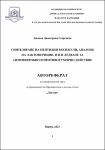I hereby declare that I will use the electronic library contents in compliance with COPYRIGHT AND RELATED RIGHTS ACT, Article 24, paragraph 1, item 9, only for scientific, cultural and educational purposes, without commercial gain, without commercial interest and non-profit.No Yes

Synthesis of Peptide Molecules, Analogues of Lactoferricin and in Vitro Screening for Antimicrobial and Antitumor Activity // Синтезиране на пептидни молекули, аналози на лактоферицин, и изследване за антимикробно и противотуморно действие

Date
2023Author
Georgieva, Dimana Dimitrova
Георгиева, Димана Димитрова
dimana.dimitrova@mu-varna.bg
Metadata
Show full item recordAbstract
Antibiotic resistance and the increasing number of diagnosed oncological diseases affect all areas of healthcare, drain the economy, and impact society. The leading importance of developing resistant bacterial strains is the appointment of antibiotics without sufficient indications and an antibiogram, as well as the fact that they are not administered according to the prescription. Antimicrobial peptides (AMPs) are a promising class of compounds to combat increasing antibiotic resistance and have the potential to combat neoplastic diseases. Using the native structure of already known natural AMPs, their mimetics (analogues) can be synthesized through chemical methods. The thesis presents the synthesis, antimicrobial and antiproliferative effects of peptide mimetics of LfcinB (20-30). All studied analogues demonstrated high hydrolytic stability (>95%). The replacement of Arg21 with Lys and Trp22 with non-protein AKs potentiates or preserves the biological effect of the analogues, while the replacement of Arg20 leads to the loss of the effectiveness of the molecule. Аntimicrobial activity was demonstrated by LfcinB1, LfcinB3, LfcinB5 and LfcinB6 against S.aureus. A minimum fungicidal concentration was demonstrated only with LfcinB1. The observed activity (cytotoxic and antiproliferative) of the studied peptides is dose-dependent. The studied peptides did not exhibit a cytotoxic effect in the analysis performed on the non-tumorigenic cell line. Антибиотичната резистентност и нарастващия брой диагностицирани онкологични заболявания, засягат всички сфери на здравеопазването, изтощава икономиката и има отражение върху обществото. Водещо значение за развитието на резистентни бактериални щамове има назначаването на антибиотиците без достатъчно показания, без направена антибиограма както и това, че не се прилагат съгласно предписанието. Антимикробните пептиди (АМП) са обещаващ клас съединения за справяне с нарастващата антибиотична резистентност и имат потенциал за борба с неопластичните заболявания. Използвайки нативната структура на вече познати природни АМП, чрез химични методи, могат да се създадат техни миметици (аналози). В настоящия труд е представен синтезът, антимикробните и антипролиферативните ефекти на пептидни миметици на LfcinB(20-30). Всички изследвани аналози демонстрират висока хидролитична стабилност (>95%). Замяната на Arg21 с Lys и Trp22 с небелтъчни АК, потенцира или запазва биологичният ефект на аналозите, докато замяната на Arg20, води до загубата на ефективността на молекулата., Антимикробна активност демонстрират LfcinB1, LfcinB3, LfcinB5 и LfcinB6 срещу S.aureus. Минимална фунгицидна концентрация е доказана само при LfcinB1. При изследваните пептиди наблюдаваната активност (цитотоксична и антипролиферативна) е от дозозависим тип. При проведеният NRU-анализ върху нетуморогенната клетъчна линия BALB/c 3T3 изследваните пептиди не проявяват цитотоксичен ефект, при концентрации по-малки от 1000 µМ.
